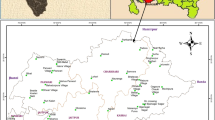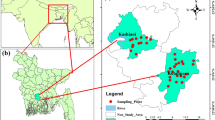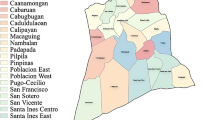Abstract
Groundwater contamination in the Indo-Gangetic alluvial plain has reportedly been affected by various factors, such as mineral dissolution, overexploitation, precipitation, and ion exchange. This study was designed to interpret the hydrochemical fluctuations in the groundwater sources of a rural area in Raebareli district. Groundwater is slightly alkaline and affected by the issues of fluoride, salinity, hardness, and nitrate. The Pollution Index of Groundwater significantly categorize 57% and 79% of the samples under the “insignificant pollution” category during pre-monsoon and post-monsoon periods. The Health risk assessment indicated the high susceptibility of children toward health risks. It also indicated that fluoride had greater impact than nitrate in the study area. The multivariate statistical analysis indicates that anthropogenic activities, such as agricultural practices, including excessive fertilizer application and improper domestic and cattle waste management, are probable causes of groundwater contamination through NO3−, Cl−, Na+, and K+. Furthermore, the base exchange index classified 71.43% samples in pre-monsoon and 78.57% in post-monsoon as Na-HCO3 type. The meteoric genesis index suggested that 78.57% and 85.71% of the samples belong to shallow meteoric water percolation type during pre- and post-monsoon periods, respectively. The Piper plots revealed that HCO3–Ca·Mg and SO4·Cl–Na + K type are the prominent facies in the area, with dominance of alkalis and weak acids. According to Gibbs plot, majority of the samples fall under “rock dominance” suggesting that “rock-water” interaction was the dominant natural process controlling the groundwater chemistry.








Similar content being viewed by others
References
Abungba JA, Khare D, Pingale SM et al (2020) Assessment of hydro-climatic trends and variability over the black volta basin in Ghana. Earth Syst Environ. https://doi.org/10.1007/s41748-020-00171-9
Adimalla N, Li P (2019) Occurrence, health risks, and geochemical mechanisms of fluoride and nitrate in groundwater of the rock-dominant semi-arid region, Telangana State, India. Hum Ecol Risk Assess 25:81–103. https://doi.org/10.1080/10807039.2018.1480353
Adimalla N, Qian H (2019) Groundwater quality evaluation using water quality index (WQI) for drinking purposes and human health risk (HHR) assessment in an agricultural region of Nanganur, south India. Ecotoxicol Environ Saf 176:153–161. https://doi.org/10.1016/j.ecoenv.2019.03.066
Adimalla N, Wu J (2019) Groundwater quality and associated health risks in a semi-arid region of south India: implication to sustainable groundwater management. Hum Ecol Risk Assess 25:191–216. https://doi.org/10.1080/10807039.2018.1546550
Ahmadi F, Nazeri Tahroudi M, Mirabbasi R et al (2018) Spatiotemporal trend and abrupt change analysis of temperature in Iran. Meteorol Appl 25:314–321. https://doi.org/10.1002/met.1694
Ali W, Aslam MW, Junaid M et al (2019a) Elucidating various geochemical mechanisms drive fluoride contamination in unconfined aquifers along the major rivers in Sindh and Punjab, Pakistan. Environ Pollut 249:535–549. https://doi.org/10.1016/j.envpol.2019.03.043
Ali W, Rasool A, Junaid M, Zhang H (2019b) A comprehensive review on current status, mechanism, and possible sources of arsenic contamination in groundwater: a global perspective with prominence of Pakistan scenario. Environ Geochem Health 41:737–760
Ansari AA, Singh IB, Tobschall HJ (2000) Importance of geomorphology and sedimentation processes for metal dispersion in sediments and soils of the Ganga Plain: identification of geochemical domains. Chem Geol 162:245–266. https://doi.org/10.1016/S0009-2541(99)00073-X
Antiguedad I, Zabaleta A, Martinez-Santos M et al (2017) A simple multi-criteria approach to delimitate nitrate attenuation zones in alluvial floodplains. Four cases in south-western Europe. Ecol Eng 103:315–331. https://doi.org/10.1016/j.ecoleng.2016.09.007
APHA (2012) Standard methods for the examination of water and wastewater, 22nd edn. American Public Health Association, Washington, DC
Ashok V, Hait S (2015) Remediation of nitrate-contaminated water by solid-phase denitrification process—a review. Environ Sci Pollut Res 22:8075–8093. https://doi.org/10.1007/s11356-015-4334-9
Batabyal AK (2018) Hydrogeochemistry and quality of groundwater in a part of Damodar Valley, Eastern India: an integrated geochemical and statistical approach. Stoch Environ Res Risk Assess 32:2351–2368. https://doi.org/10.1007/s00477-018-1552-y
Batabyal AK, Chakraborty S (2015) Hydrogeochemistry and water quality index in the assessment of groundwater quality for drinking uses. Water Environ Res 87:607–617. https://doi.org/10.2175/106143015x14212658613956
Bhattacharya P, Claesson M, Bundschuh J et al (2006) Distribution and mobility of arsenic in the Río Dulce alluvial aquifers in Santiago del Estero Province, Argentina. Sci Total Environ 358:97–120. https://doi.org/10.1016/j.scitotenv.2005.04.048
BIS (2012) Bureau of Indian Standards, Drinking Water-Specification, Second Revision. IS10500
Chen J, Wu H, Qian H (2016) Groundwater nitrate contamination and associated health risk for the rural communities in an agricultural area of Ningxia, Northwest China. Expo Health 8:349–359. https://doi.org/10.1007/s12403-016-0208-8
Chen J, Wu H, Qian H, Gao Y (2017) Assessing nitrate and fluoride contaminants in drinking water and their health risk of rural residents living in a semiarid region of Northwest China. Expo Health 9:183–195. https://doi.org/10.1007/s12403-016-0231-9-
Chung SY, Venkatramanan S, Kim TH et al (2015) Influence of hydrogeochemical processes and assessment of suitability for groundwater uses in Busan City, Korea. Environ Dev Sustain 17:423–441. https://doi.org/10.1007/s10668-014-9552-7
Dar MA, Sankar K, Dar IA (2011) Fluorine contamination in groundwater: a major challenge. Environ Monit Assess 173:955–968. https://doi.org/10.1007/s10661-010-1437-0
Devic G, Djordjevic D, Sakan S (2014) Natural and anthropogenic factors affecting the groundwater quality in Serbia. Sci Total Environ 468–469:933–942. https://doi.org/10.1016/j.scitotenv.2013.09.011
Dinpashoh Y, Mirabbasi R, Jhajharia D et al (2014) Effect of short-term and long-term persistence on identification of temporal trends. J Hydrol Eng 19:617–625. https://doi.org/10.1061/(ASCE)HE.1943-5584.0000819
Egbueri JC (2018) Assessment of the quality of groundwaters proximal to dumpsites in Awka and Nnewi metropolises: a comparative approach. Int J Energy Water Resour 2:33–48. https://doi.org/10.1007/s42108-018-0004-1
Egbueri JC (2020) Groundwater quality assessment using pollution index of groundwater (PIG), ecological risk index (ERI) and hierarchical cluster analysis (HCA): a case study. Groundw Sustain Dev 10:100292. https://doi.org/10.1016/j.gsd.2019.100292
Etikala B, Golla V, Adimalla N, Marapatla S (2019) Factors controlling groundwater chemistry of Renigunta area, Chittoor District, Andhra Pradesh, South India: a multivariate statistical approach. HydroResearch 1:57–62. https://doi.org/10.1016/j.hydres.2019.06.002
Fatema K, Wan Maznah WO, Isa MM (2014) Spatial and temporal variation of physico-chemical parameters in the merbok estuary, Kedah, Malaysia. Trop Life Sci Res 25:1–19
Gibbs RJ (1970) Mechanisms controlling world water chemistry. Science 170:1088–1090. https://doi.org/10.1126/science.170.3962.1088
Goel P (2018) Identification of the source mineral releasing arsenic in the groundwater of the Indo-Gangetic Plain, India. In: Hussain CM (ed) Handbook of environmental materials management. Springer International Publishing, pp 1–38
He S, Wu J (2019) Relationships of groundwater quality and associated health risks with land use/land cover patterns: a case study in a loess area, Northwest China. Hum Ecol Risk Assess 25:354–373. https://doi.org/10.1080/10807039.2019.1570463
He X, Wu J, He S (2019) Hydrochemical characteristics and quality evaluation of groundwater in terms of health risks in Luohe aquifer in Wuqi County of the Chinese Loess Plateau, northwest China. Hum Ecol Risk Assess 25:32–51. https://doi.org/10.1080/10807039.2018.1531693
He X, Li P, Wu J et al (2020) Poor groundwater quality and high potential health risks in the Datong Basin, northern China: research from published data. Environ Geochem Health. https://doi.org/10.1007/s10653-020-00520-7
Janardhana Raju N, Shukla UK, Ram P (2011) Hydrogeochemistry for the assessment of groundwater quality in Varanasi: a fast-urbanizing center in Uttar Pradesh, India. Environ Monit Assess 173:279–300. https://doi.org/10.1007/s10661-010-1387-6
Kant N, Singh PK, Kumar B (2018) Hydrogeochemical characterization and groundwater quality of Jamshedpur urban agglomeration in Precambrian Terrain, Eastern India. J Geol Soc India 92:67–75. https://doi.org/10.1007/s12594-018-0954-2
Karunanidhi D, Aravinthasamy P, Deepali M et al (2020a) The effects of geochemical processes on groundwater chemistry and the health risks associated with fluoride intake in a semi-arid region of South India. RSC Adv 10:4840–4859. https://doi.org/10.1039/c9ra10332e
Karunanidhi D, Aravinthasamy P, Roy PD et al (2020b) Evaluation of non-carcinogenic risks due to fluoride and nitrate contaminations in a groundwater of an urban part (Coimbatore region) of south India. Environ Monit Assess. https://doi.org/10.1007/s10661-019-8059-y
Kaur T, Bhardwaj R, Arora S (2017) Assessment of groundwater quality for drinking and irrigation purposes using hydrochemical studies in Malwa region, southwestern part of Punjab, India. Appl Water Sci 7:3301–3316. https://doi.org/10.1007/s13201-016-0476-2
Khan R, Saxena A, Shukla S (2020) Evaluation of heavy metal pollution for River Gomti, in parts of Ganga Alluvial Plain, India. SN Appl Sci 2:1451. https://doi.org/10.1007/s42452-020-03233-9
Kumar S, Saxena A (2011) Chemical weathering of the Indo-Gangetic alluvium with special reference to release of fluoride in the groundwater, Unnao district, Uttar Pradesh. J Geol Soc India 77:459–477. https://doi.org/10.1007/s12594-011-0048-x
Kumari P, Gupta NC, Kaur A, Singh K (2019) Application of principal component analysis and correlation for assessing groundwater contamination in and around municipal solid waste landfill of Ghazipur, Delhi. J Geol Soc India 94:595–604. https://doi.org/10.1007/s12594-019-1366-7
Li P, Li X, Meng X et al (2016a) Appraising groundwater quality and health risks from contamination in a semiarid region of Northwest China. Expo Health 8:361–379. https://doi.org/10.1007/s12403-016-0205-y
Li P, Wu J, Qian H (2016b) Hydrochemical appraisal of groundwater quality for drinking and irrigation purposes and the major influencing factors: a case study in and around Hua County, China. Arab J Geosci 9:1–17. https://doi.org/10.1007/s12517-015-2059-1
Li P, Tian R, Xue C, Wu J (2017) Progress, opportunities, and key fields for groundwater quality research under the impacts of human activities in China with a special focus on western China. Environ Sci Pollut Res 24:13224–13234. https://doi.org/10.1007/s11356-017-8753-7
Li P, Qian H, Wu J (2018) Conjunctive use of groundwater and surface water to reduce soil salinization in the Yinchuan Plain, North-West China. Int J Water Resour Dev 34:337–353. https://doi.org/10.1080/07900627.2018.1443059
Li P, He X, Guo W (2019) Spatial groundwater quality and potential health risks due to nitrate ingestion through drinking water: a case study in Yan’an City on the Loess Plateau of northwest China. Hum Ecol Risk Assess 25:11–31. https://doi.org/10.1080/10807039.2018.1553612
Lima IQ, Muñoz MO, Ramos OER et al (2019) Hydrochemical assessment with respect to arsenic and other trace elements in the Lower Katari Basin, Bolivian Altiplano. Groundw Sustain Dev 8:281–293. https://doi.org/10.1016/j.gsd.2018.11.013
Loh YSA, Akurugu BA, Manu E, Aliou AS (2020) Assessment of groundwater quality and the main controls on its hydrochemistry in some Voltaian and basement aquifers, northern Ghana. Groundw Sustain Dev 10:100296. https://doi.org/10.1016/j.gsd.2019.100296
MacDonald AM, Bonsor HC, Ahmed KM et al (2016) Groundwater quality and depletion in the Indo-Gangetic Basin mapped from in situ observations. Nat Geosci 9:762–766. https://doi.org/10.1038/ngeo2791
Mondal NC, Singh VP (2012) Chloride migration in groundwater for a tannery belt in Southern India. Environ Monit Assess 184:2857–2879. https://doi.org/10.1007/s10661-011-2156-x
Nasirian M (2007) A new water quality index for environmental contamination contributed by mineral processing: a case study of amang (tin tailing) processing activity. J Appl Sci 7:2977–2987. https://doi.org/10.3923/jas.2007.2977.2987
Piper AM (1944) A graphic procedure in the geochemical interpretation of water-analyses. EOS Trans Am Geophys Union 25:914–928. https://doi.org/10.1029/TR025i006p00914
Qasemi M, Afsharnia M, Zarei A et al (2019) Non-carcinogenic risk assessment to human health due to intake of fluoride in the groundwater in rural areas of Gonabad and Bajestan, Iran: a case study. Hum Ecol Risk Assess 25:1222–1233. https://doi.org/10.1080/10807039.2018.1461553
Qian H, Peiyue L (2011) Hydrochemical characteristics of groundwater in Yinchuan plain and their control factors. Asian J Chem 23:2927–2938
Raj D, Shaji E (2017) Fluoride contamination in groundwater resources of Alleppey, southern India. Geosci Front 8:117–124. https://doi.org/10.1016/j.gsf.2016.01.002
Rao NS, Sunitha B, Rambabu R et al (2018) Quality and degree of pollution of groundwater, using PIG from a rural part of Telangana State, India. Appl Water Sci. https://doi.org/10.1007/s13201-018-0864-x
Rasool A, Xiao T, Farooqi A et al (2016) Arsenic and heavy metal contaminations in the tube well water of Punjab, Pakistan and risk assessment: a case study. Ecol Eng 95:90–100. https://doi.org/10.1016/j.ecoleng.2016.06.034
Rasool A, Farooqi A, Xiao T et al (2017) A review of global outlook on fluoride contamination in groundwater with prominence on the Pakistan current situation. Environ Geochem Health 40:1265–1281
Rishi MS, Kaur L, Sharma S (2019) Groundwater quality appraisal for non-carcinogenic human health risks and irrigation purposes in a part of Yamuna sub-basin. Hum Ecol Risk Assess, India. https://doi.org/10.1080/10807039.2019.1682514
Saha R, Dey NC, Rahman S et al (2018) Exploring suitable sites for installing safe drinking water wells in coastal Bangladesh. Groundw Sustain Dev 7:91–100. https://doi.org/10.1016/j.gsd.2018.03.002
Sahoo PK, Kim K, Powell MA (2016) Managing groundwater nitrate contamination from livestock farms: implication for nitrate management guidelines. Curr Pollut Rep 2:178–187. https://doi.org/10.1007/s40726-016-0033-5
Sahu P, Kisku GC, Singh PK et al (2018) Multivariate statistical interpretation on seasonal variations of fluoride-contaminated groundwater quality of Lalganj Tehsil, Raebareli District (UP), India. Environ Earth Sci. https://doi.org/10.1007/s12665-018-7658-1
Saris NEL, Mervaala E, Karppanen H et al (2000) Magnesium: an update on physiological, clinical and analytical aspects. Clin Chim Acta 294:1–26
Sawyer CN, McCarty PL, Parkin GF (2003) Chemistry for environmental engineering and science, 5th edn. McGraw Hill Pubication, New York
Selvakumar S, Ramkumar K, Chandrasekar N et al (2017) Groundwater quality and its suitability for drinking and irrigational use in the Southern Tiruchirappalli district, Tamil Nadu, India. Appl Water Sci 7:411–420. https://doi.org/10.1007/s13201-014-0256-9
Şener Ş, Şener E, Davraz A (2017) Evaluation of water quality using water quality index (WQI) method and GIS in Aksu River (SW-Turkey). Sci Total Environ 584–585:131–144. https://doi.org/10.1016/j.scitotenv.2017.01.102
Shankar BS, Balasubramanya N, Maruthesha Reddy MT (2008) Impact of industrialization on groundwater quality: a case study of Peenya industrial area, Bangalore, India. Environ Monit Assess 142:263–268. https://doi.org/10.1007/s10661-007-9923-8
Shanyengana ES, Seely MK, Sanderson RD (2004) Major-ion chemistry and ground-water salinization in ephemeral floodplains in some arid regions of Namibia. J Arid Environ 57:211–223. https://doi.org/10.1016/S0140-1963(03)00095-8
Shirke KD, Kadam AK, Pawar NJ (2020) Temporal variations in hydro-geochemistry and potential health risk assessment of groundwater from lithological diversity of semi-arid region, Western Gujarat, India. Appl Water Sci. https://doi.org/10.1007/s13201-020-01235-x
Shukla S, Saxena A (2020a) Sources and leaching of nitrate contamination in groundwater. Curr Sci 118:883–891. https://doi.org/10.18520/cs/v118/i6/883-891
Shukla S, Saxena A (2020b) Groundwater quality and associated human health risk assessment in parts of Raebareli district, Uttar Pradesh, India. Groundw Sustain Dev 10:100366. https://doi.org/10.1016/j.gsd.2020.100366
Singh M, Sharma M, Tobschall HJ (2005) Weathering of the Ganga alluvial plain, northern India: implications from fluvial geochemistry of the Gomati River. Appl Geochem 20:1–21. https://doi.org/10.1016/j.apgeochem.2004.07.005
Singh VK, Bikundia DS, Sarswat A, Mohan D (2012) Groundwater quality assessment in the village of Lutfullapur Nawada, Loni, District Ghaziabad, Uttar Pradesh, India. Environ Monit Assess 184:4473–4488. https://doi.org/10.1007/s10661-011-2279-0
Singh UV, Abhishek A, Singh KP et al (2014) Groundwater quality appraisal and its hydrochemical characterization in Ghaziabad (a region of indo-gangetic plain), Uttar Pradesh, India. Appl Water Sci 4:145–157. https://doi.org/10.1007/s13201-013-0137-7
Soltan ME (1999) Evaluation of ground water quality in Dakhla Oasis (Egyptian Western Desert). Environ Monit Assess 57:157–168. https://doi.org/10.1023/A:1005948930316
Spearman C (1904) The proof and measurement of association between two things. Am J Psychol 15:72. https://doi.org/10.2307/1412159
Su Z, Wu J, He X, Elumalai V (2020) Temporal changes of groundwater quality within the groundwater depression cone and prediction of confined groundwater salinity using grey markov model in Yinchuan Area of Northwest China. Expo Health. https://doi.org/10.1007/s12403-020-00355-8
Subba Rao N (2012) PIG: a numerical index for dissemination of groundwater contamination zones. Hydrol Process 26:3344–3350. https://doi.org/10.1002/hyp.8456
Subba Rao N (2018) Groundwater quality from a part of Prakasam District, Andhra Pradesh, India. Appl Water Sci. https://doi.org/10.1007/s13201-018-0665-2
Subba Rao N, Chaudhary M (2019) Hydrogeochemical processes regulating the spatial distribution of groundwater contamination, using pollution index of groundwater (PIG) and hierarchical cluster analysis (HCA): a case study. Groundw Sustain Dev 9:100238. https://doi.org/10.1016/j.gsd.2019.100238
Subba Rao N, Srihari C, Deepthi Spandana B et al (2019) Comprehensive understanding of groundwater quality and hydrogeochemistry for the sustainable development of suburban area of Visakhapatnam, Andhra Pradesh, India. Hum Ecol Risk Assess 25:52–80. https://doi.org/10.1080/10807039.2019.1571403
Suthar S, Bishnoi P, Singh S et al (2009) Nitrate contamination in groundwater of some rural areas of Rajasthan, India. J Hazard Mater 171:189–199. https://doi.org/10.1016/j.jhazmat.2009.05.111
Tripathi JK, Ghazanfari P, Rajamani V, Tandon SK (2007) Geochemistry of sediments of the Ganges alluvial plains: evidence of large-scale sediment recycling. Quat Int 159:119–130. https://doi.org/10.1016/j.quaint.2006.08.016
USEPA (1989) Risk assessment: guidance for superfund volume 1 human health evaluation manual (part A). Washington, DC
USEPA (1991) Risk assessment guidance for superfund, vol 1: human health evaluation manual (part B, development of risk-based preliminary remediation goals). Washington, DC
USEPA (2014) Human health evaluation manual, supplemental guidance: update of standard default exposure factors-OSWER directive 9200.1-120. Washington, DC
Vinod PN, Chandramouli PN, Koch M (2015) Estimation of nitrate leaching in groundwater in an agriculturally used area in the state karnataka, india, using existing model and GIS. Aquat Procedia 4:1047–1053. https://doi.org/10.1016/j.aqpro.2015.02.132
Wang D, Wu J, Wang Y, Ji Y (2020) Finding high-quality groundwater resources to reduce the hydatidosis incidence in the Shiqu County of Sichuan Province, China: analysis, assessment, and management. Expo Heal 12:307–322. https://doi.org/10.1007/s12403-019-00314-y
WHO (2011) Guidelines for drinking-water quality, 4th edn. World Health Organization, Geneva
Woldeab B, Beyene A, Ambelu A et al (2018) Seasonal and spatial variation of reservoir water quality in the southwest of Ethiopia. Environ Monit Assess 190:1–13. https://doi.org/10.1007/s10661-018-6527-4
Yidana SM, Banoeng-Yakubo B, Sakyi PA (2012) Identifying key processes in the hydrochemistry of a basin through the combined use of factor and regression models. J Earth Syst Sci 121:491–507. https://doi.org/10.1007/s12040-012-0163-0
Zhai Y, Zhao X, Teng Y et al (2017) Groundwater nitrate pollution and human health risk assessment by using HHRA model in an agricultural area, NE China. Ecotoxicol Environ Saf 137:130–142. https://doi.org/10.1016/j.ecoenv.2016.11.010
Zhang Y, Wu J, Xu B (2018) Human health risk assessment of groundwater nitrogen pollution in Jinghui canal irrigation area of the loess region, northwest China. Environ Earth Sci 77:273. https://doi.org/10.1007/s12665-018-7456-9
Zhu B, Wang X, Rioual P (2017) Multivariate indications between environment and ground water recharge in a sedimentary drainage basin in northwestern China. J Hydrol 549:92–113. https://doi.org/10.1016/j.jhydrol.2017.03.058
Acknowledgements
The authors thank Dr. A. K. Singh, Vice-Chancellor, Shri Ramswaroop Memorial University for providing lab facilities to conduct this study. They also acknowledge the contributions from Ms. Ramsha Khan and Mr. Selvakumar.
Funding
This research did not receive any specific Grant from funding agencies in the public, commercial, or not-for-profit sectors.
Author information
Authors and Affiliations
Corresponding author
Ethics declarations
Conflict of interest
The authors declare that they have no conflict of interest.
Rights and permissions
About this article
Cite this article
Shukla, S., Saxena, A. Appraisal of Groundwater Quality with Human Health Risk Assessment in Parts of Indo-Gangetic Alluvial Plain, North India. Arch Environ Contam Toxicol 80, 55–73 (2021). https://doi.org/10.1007/s00244-020-00771-6
Received:
Accepted:
Published:
Issue Date:
DOI: https://doi.org/10.1007/s00244-020-00771-6




